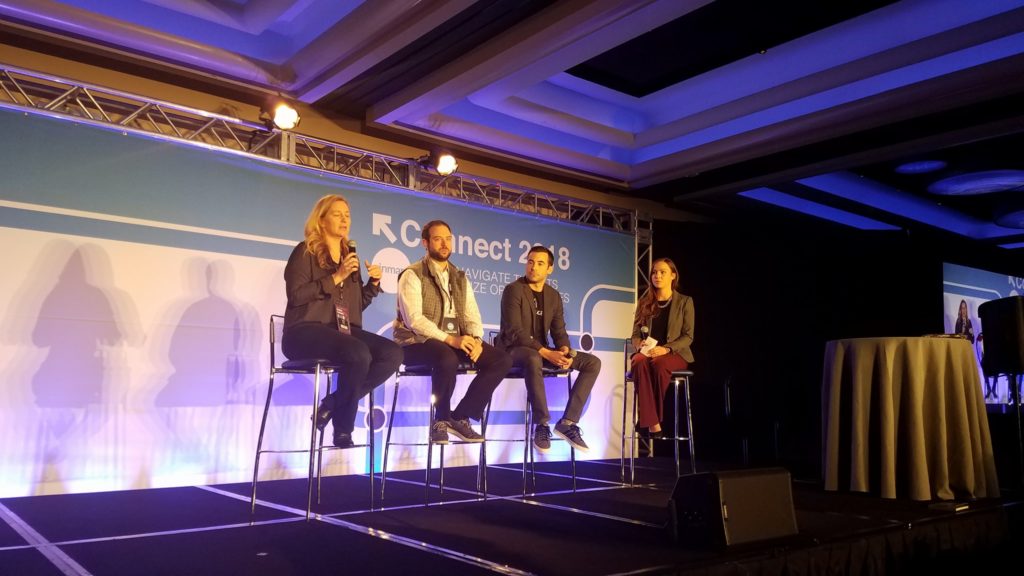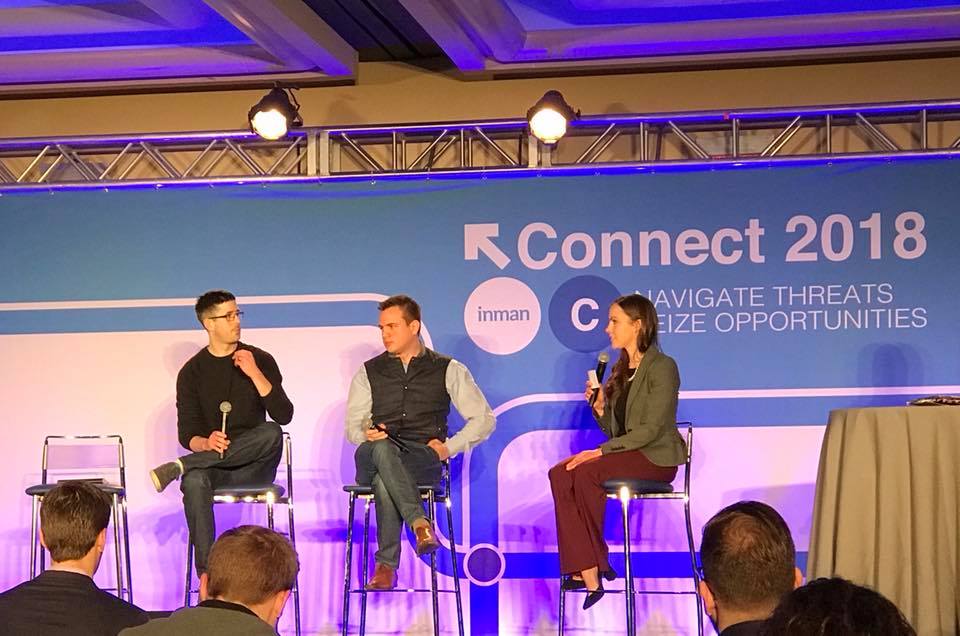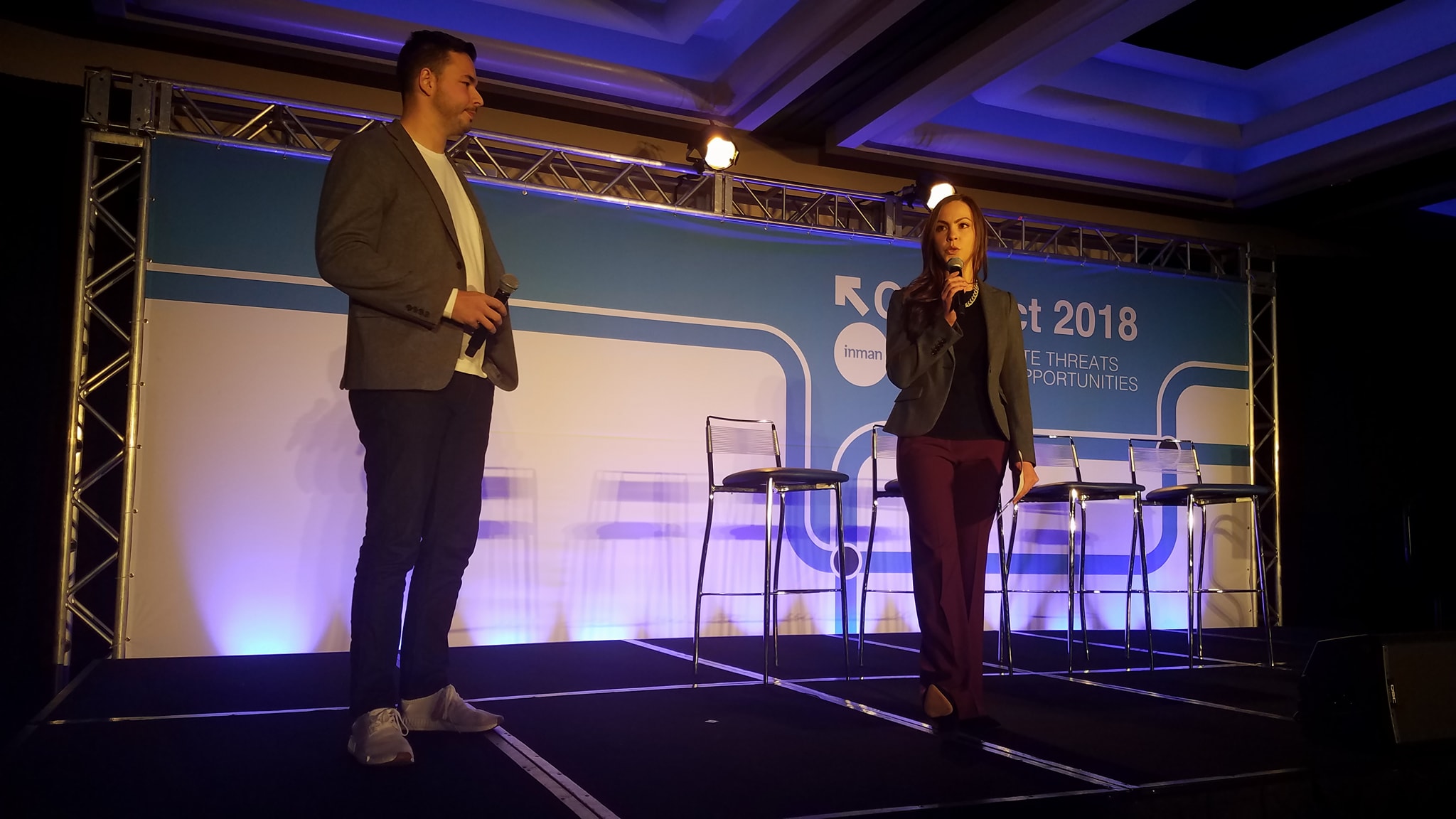What is Hacker Connect?
If you’re not familiar, Inman recently added a full-day track focused on the real estate tech community. This event, Hacker Connect, kicks off the week-long, twice-annual Inman Connect conference, which wrapped up last week in New York City.
This year, I was asked to co-moderate Hacker Connect along with Adi Pavlovic, the Director of Keller Williams Innovation Labs. The day was jam-packed with great content and super technical sessions — right up my alley. I had a blast getting to interview all of our knowledgable panelists, and it was amazing to get a first look at what some big real estate tech companies are working on right now.
Session Content
The full list of Hacker Connect content is available here.
Here’s a quick recap on the solo presenters.
- Dr. Kate Stone, The Internet of Things
Attendees got to experience the wonder of when music and everyday objects (like belts, notebooks and even pizza boxes) collide. - Zane Memon, Cool Stuff OpenDoor is Inventing
Zane took us through the hardware and software behind OpenDoor’s technology, as well as what they’re innovating next. - Andrew Gowasack, Authentication Game Changers
A deep dive into how biometrics, fingerprints and more impact the real estate industry. - Mike O’Toole, Hacks That are Making Life Easier for Agents
From image tagging software to tools that will convert messy data into normalized data, Mike had some great tips for the crowd — which extended far beyond just agents. - Andrew Sheh, Breakthroughs in Predictive Analytics
Talk about walking away with a ton of data! Andrew’s presentation wasn’t just theoretical, he gave real-life examples of current trends. - Josh Vickery, SquareFoot, & Cary Sylvester, Vast.com, Tools to Tap Value in Your Real Estate Data
Curious what tools and services innovative tech companies are using? We got the full scoop, along with how they use them.

Photo taken by Brandon Doyle
We also hosted some really interesting panels, making the knowledge share more interactive for this group.
Learn About Our New Ads and Leads Program - TRIBUS Engage
- Live Problem Solving
Attendees got to ask panelists for input on how to overcome issues they were facing. Some questions included displaying international listing data, issues with scaling, AI and QA processes.
Panelists: Jon Mabe, Zillow Group & Zvi Band, Contactually. Masha Sharma, RealAtom & Amanda Marcie-Roberts, HomeSpotter. Jess Martin, First & Lucie Fortier, CoreLogic. Jeremy Crawford, RESO & Jonathan Aizen, Amitree. - API Alternatives Like GraphQL
By far my favorite session to moderate. Many companies now have alternative options to power integrations with large data sets, and walked away with a solid knowledge of how to migrate over.
Panelists: L.D. Salmanson, Cherre & Nic Cavigliano, RealScout

TRIBUS VP of Product Katie Ragusa at Inman’s Hacker Connect moderating the panel on GraphQL
- The Eleventh Hour: How to Successfully Roll Out a New Product
Matthew and Katherine have actually worked on project rollouts together in the past, so they shared their joint insights on the process, with a focus on documenting everything.
Panelists: Matthew Shadbolt, Inman & Katherine McMahan, New York Times. - Solving the Tech Integration Problem
Integrations are popular, but can be really problematic. Whether it’s due to a lack of spec (or no specs at all), non-responsive parties or misaligned expectations, this group shared what they’ve learned over the years.
Panelists: Stefan Martinovic, REBNY, Shane Farkas, The Agency & Lucie Fortier, CoreLogic. - Product Updates from the Big Guns
Realtor.com, Zillow, Google and Facebook let us through some exciting product updates we can expect in 2018, as well as ways all four companies are actually allies rather than enemies.
Panelists: Todd Callow, realtor.com, Paul Watson, Google, Keith Watts, Facebook & Sara Bonert, Zillow Group.
What I Learned
Unexpectedly, my biggest takeaway was quite simple. It was really cool to get a behind-the-scenes look at the tech stack, tools and services that many companies who I look up to are using. This gave me new and innovative ideas to take back to my own team, as well as validated some that we’re already using (the biggest trend being that many companies build on AWS, just like TRIBUS).
Learn About Our New Ads and Leads Program - TRIBUS Engage
The tech community is a bit shy :)
We hosted a total of four live problem solving sessions, intermingled with other sessions throughout the day. And while our panelists were absolute experts in their fields, and I’m sure the crowd wanted to discuss common problems with them, the room was consistently (almost painfully) quiet. I think the concept of these sessions is awesome, but hope that next time the crowd might break up into smaller topic-based table discussions, or would be able to chat/email in their questions ahead of time rather than needing to walk up on stage.
The integration problem
There’s a pattern around the topic of integration, and it’s not nearly as positive as I once thought. It seems that many companies struggle to keep up with the demands of their customers for more and more integrations, for two main reasons I observed.
- There’s no standard protocol for integrations, and each company uses different methods and protocols. This makes each integration its own brand-new feature to develop from scratch, and not something you can easily replicate again and again (no matter how good your documentation is).
- Clients approach two companies that they really like and request an integration. Then the ball gets rolling before anyone managing the project steps back and considers the core purpose of the integration — what are we trying to solve? Beginning technical spec discussions prior to looking at the big picture causes wasted development time on some features that won’t even really benefit users (turning the project into a checkbox to make the integration exist, rather than focusing on the actual impact).
There’s also a very big focus on features — too big in my opinion. We need to bring the discussion full circle and also talk about staffing development, teams and programmer happiness, scope and project planning, how to actually plan the sprints, and the test writing/QA and release cycles. Getting wrapped up in cool features that people are working on is fun, but if we don’t use the time we have at events like Hacker Connect with the CTO/engineering leads to talk about the more “boring” topics, we can’t bring back nearly as much value to our teams.
Learn About Our New Ads and Leads Program - TRIBUS Engage
What’s Next
To prepare for Hacker Connect’s technical track, Adi and I considered what we saw in store for real estate tech in 2018. Here are the 5 topics that made my list.
- AI: B2C
Increasingly intelligent and capable chatbots are flooding the industry, focused on lead generation and nurturing in order to appease consumers who want on-demand information. Since bots have become more familiar and humanlike, trust in bot responses has improved immensely. But how far can an (unlicensed) chatbot really take you in your real estate search? - Better Targeted Ads
Ad platforms are becoming progressively more intelligent in identifying consumer preferences and likelihood to buy or sell, which has the potential to greatly improve the ROI of online advertising. In the coming year, we should also see a quicker and simpler setup process, so that agents can launch a new campaign or schedule one in advance with very few clicks. - Data Pushing into MLSs
Pushing data directly into an MLS means simpler listing and transaction management for agents and their consumers. MLSs are starting to allow integrated services to push new listings into their system, which will allow brokers to offer better tools and systems to their agents and help them more seamlessly manage their data. - Increasing Tools for Sellers
Search portals, brokers, and iBuyers are making it easier for consumers to sell. In addition to all the existing tools available to sellers with active listings, we’ll see an increase in predictive tools that will help potential new sellers plan out when to list and at what price, based on more granular market trends and better AVM models. - More Focus on Brokerage UX
Now that we have huge amounts of consumer data to look at from the large portal sites, brokers are following suit, and considering the consumer’s experience more than ever — a shift from the older trend of placing their main focus on their company’s own listings.
To everyone who attended Hacker Connect — thanks for contributing to the real estate tech community!
I had the opportunity to meet quite a few of you, and I’m looking forward to continuing the conversation and seeing how your products advance over the coming year. See you in San Francisco!

